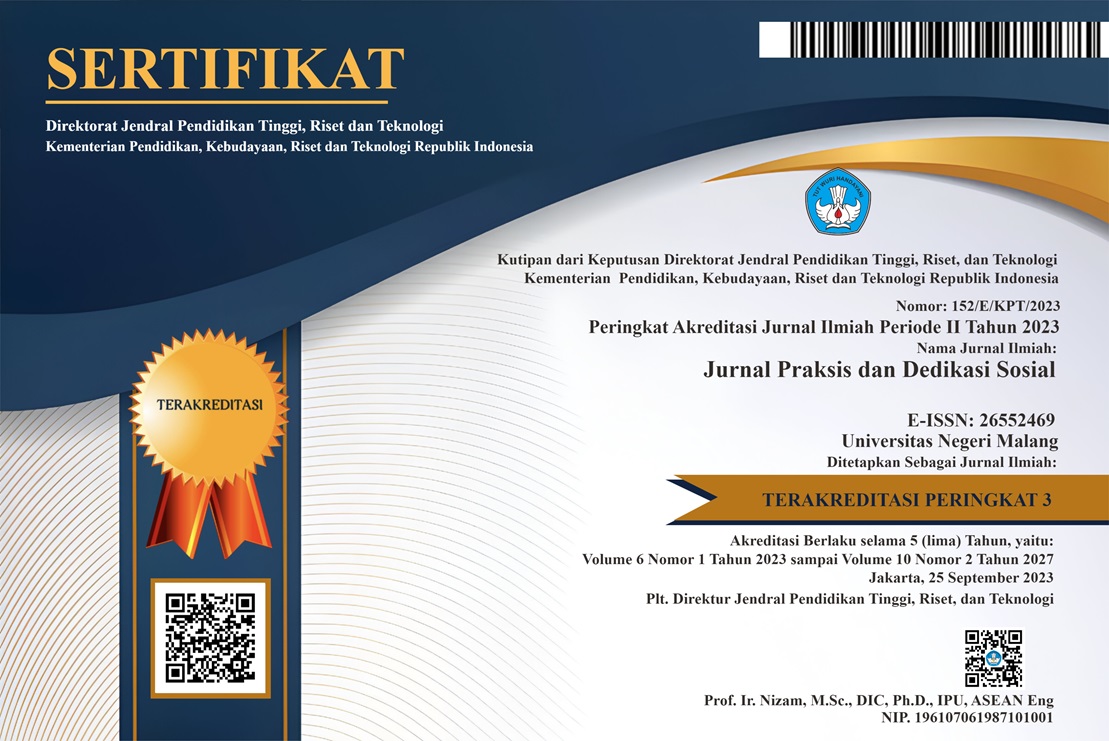PROFIL KETERAMPILAN KOMUNIKASI BAHASA INGGRIS PRAMUSAJI CAFE DI DESA WISATA, BALI
Abstract
ENGLISH COMMUNICATION SKILLS PROFILE OF CAFE WAITRESSES IN TOURIST VILLAGES, BALI
The objective of this study was to present the profile of English communication skills among servers in Bali. The research employs the phenomenological method and involves 30 participants working as waiters in restaurants and cafes in the Tourism Village of Ubud and Celuk, Gianyar Regency, Bali. The data collection techniques used in this study are interviews and observations. Interview and observation guides are used to reveal the servers' English communication profiles. The data collected were analysed using data reduction, presentation, and conclusion-drawing techniques. The study findings suggest that servers' English communication skills encompass personal, regulatory, interactional, formative, imaginative, and instrumental functions in various situational contexts. The findings support existing theories, provide insight into research in similar contexts, and inform tourism and hospitality industry policymakers.
Penelitian ini bertujuan untuk mengungkap profil kemampuan komunikasi bahasa inggris pramusaji di Bali. Penelitian ini menggunakan metode fenomenologi. Subyek dalam penelitian ini adalah pramusaji restoran dan cafe yang berada di Desa Wisata Ubud dan Celuk, Kabupaten Gianyar, Bali sebanyak 6 partisipan. Teknik pengumpulan data menggunakan wawancara dan observasi. Sementara instrumen yang digunakan untuk mengungkap profil komunikasi bahasa inggris pramusaji adalah panduan wawancara dan observasi. Data yang telah terkumpul kemudian dianalisis meliputi reduksi data, penyajian data, dan penarikan kesimpulan. Temuan penelitian ini menunjukkan bahwa profil kemampuan komunikasi bahasa inggris pramusaji mencakup fungsi personal, regulator, interaksional, formatif, imajinatif, dan instrumental terlihat dalam berbagai konteks situasional. Temuan ini mempertegas teori yang ada sekaligus memberikan wawasan terhadap penelitian dalam konteks serupa serta para pemangku kebijakan di industri pariwisata dan perhotelan.
Keywords
Full Text:
PDFReferences
Ahmad, W., & Zhang, Q. (2020). Green purchase intention: Effects of electronic service quality and customer green psychology. Journal of cleaner production, 267, 122053. https://doi.org/10.1016/j.jclepro.2020.122053
Alhelalat, J. A., Ma’moun, A. H., & Twaissi, N. M. (2017). The impact of personal and functional aspects of restaurant employee service behaviour on customer satisfaction. International Journal of Hospitality Management, 66, 46-53.
Andriani, D., Veronika, R., & Achmadi, N. S. (2020). The implementation of waiters and waitresses’ upselling techniques at ticket’s cafe of Horison Ultima Makassar Hotel. Pusaka: Journal of Tourism, Hospitality, Travel and Business Event, 2(1), 59-65.
Andriyani, A. A. A. D. (2020). Phenomenon of Multilingual Society among Tourist Actors: A Case Study at Kuta Beach of Bali. e-Review of Tourism Research, 17(6), 821-836.
Ariffin, A. A. M., & Maghzi, A. (2012). A preliminary study on customer expectations of hotel hospitality: Influences of personal and hotel factors. International Journal of Hospitality Management, 31(1), 191-198.
Baird, A. M., & Parayitam, S. (2019). Employers’ ratings of importance of skills and competencies college graduates need to get hired: Evidence from the New England region of USA. Education+ Training, 61(5), 622-634.
Bobanovic, M. K., & Grzinic, J. (2011). The importance of English language skills in the tourism sector: A comparative study of students/employees perceptions in Croatia. Almatourism-Journal of Tourism, Culture and Territorial Development, 2(4), 10-23.
Bouranta, N., Chitiris, L., & Paravantis, J. (2009). The relationship between internal and external service quality. International Journal of Contemporary Hospitality Management, 21(3), 275-293.
Halliday, M. A. (2014). Language as social semiotic. The Discourse Studies Reader. Amsterdam: John Benjamins.
Hasan, N. N. A., Sofian, M. R. M., Kamarulbaid, A. M., & Ithnan, I. H. M. (2022). “Hello, Selamat Datang!” A preliminary proposed model of tourism interpersonal communication from an Islamic perspective amongst frontliners. Al-Islam - Journal of Contemporary Islamic Communication and Media, 2(1). https://doi.org/10.33102/jcicom.vol2no1.45
Ianioglo, A., & Rissanen, M. (2020). Global trends and tourism development in peripheral areas. Scandinavian Journal of Hospitality and Tourism, 20(5), 520-539.
Jacob, C., & Guéguen, N. (2014). The effect of compliments on customers’ compliance with a food server's suggestion. International Journal of Hospitality Management, 40, 59-61.
Jokom, R., Widjaja, D. C., Kristanti, M., & Wijaya, S. (2023). Culinary and destination experiences on behavioral intentions: An insight into local Indonesian food. Journal of Foodservice Business Research, 1-18.
Kardijan, D., & Yundayani, A. (2019). Students’present condition in implemting English for hospitality program. Lingua Didaktika: Jurnal Bahasa dan Pembelajaran Bahasa, 12(2), 128-139.
Keet, C. M., & Khumalo, L. (2017). Grammar rules for the isi Zulu complex verb. Southern African linguistics and applied language studies, 35(2), 183-200.
Koerniawati, F. T. (2022). Destinasi wisata, sumber daya manusia pariwisata dan pariwisata berkelanjutan. Siwayang Journal: Publikasi Ilmiah Bidang Pariwisata, Kebudayaan, Dan Antropologi, 1(1), 39-50.
Lennon, P. (1991). Error: Some problems of definition, identification, and distinction. Applied linguistics, 12(2), 180-196.
Lexy J, M. (2019). Metodologi penelitian kualitatif. Bandung: Remaja Rosdakarya.
Lim, Y. M., Lee, T. H., Yap, C. S., & Ling, C. C. (2016). Employability skills, personal qualities, and early employment problems of entry-level auditors: Perspectives from employers, lecturers, auditors, and students. Journal of Education for Business, 91(4), 185-192.
Paksoy, M., Soyer, F., & Çalık, F. (2017). The impact of managerial communication skills on the levels of job satisfaction and job commitment. Journal of Human Sciences, 14(1), 642-652.
Paragae, I. G. A. P. N. S. (2022). Kesiapan keterampilan komunikasi Bahasa Inggris lulusan lembaga pelatihan kerja pariwisata dalam bekerja di bidang pariwisata. Cultoure: Jurnal Ilmiah Pariwisata Budaya Hindu, 3(1), 31.
Plant, K., & Slippers, J. (2015). Improving the business communication skills of postgraduate internal audit students: A South African teaching innovation. Innovations in Education and Teaching International, 52(3), 310-321.
Praveena, K. R., & Sasikumar, S. (2021). Application of Colaizzi’s method of data analysis in phenomenological research. Med Leg Updat, 21(2), 914-918.
Robles, M. M. (2012). Executive perceptions of the top 10 soft skills needed in today’s workplace. Business Communication Quarterly, 75(4), 453-465.
Safitri, R. H. R., Fadilah, O. A., & Halim, V. (2023). Service skills in solving hotel guest problems in the food and beverage service department in the post-COVID-19 pandemic in the hospitality world. Journal of Gastro Tourism, 1(1), 21-27.
Salim, M. A. B., Ibrahim, N. A. B., & Hassan, H. (2012). Language for tourism: A review of literature. Procedia-Social and Behavioral Sciences, 66, 136-143.
Shendy, R. (2019). The limitations of reading to young children in literary Arabic: The unspoken struggle with Arabic diglossia. Theory and Practice in Language Studies, 9(2), 123-130.
Sumaiya, B., Srivastava, S., Jain, V., & Prakash, V. (2022). The role of effective communication skills in professional life. World Journal of English Language, 12(3), 134-140.
Takada, K., Murakami, K. H., Yamazaki, A. K., & Yamanakac, T. (2022). A preliminary study of VR English training material for personnel in the tourism industry. Procedia Computer Science, 207, 3721-3729.
Tang, T. (2016). Discourse and Pragmatics in English Grammar Teaching. ELT Journal, 102, 10-19.
Tankovic, A. C., Kapeš, J., & Benazić, D. (2023). Measuring the importance of communication skills in tourism. Economic research-Ekonomska istraživanja, 36(1), 460-479.
Tanković, A. C., Kapeš, J., & Kraljić, V. (2021). Importance of soft skills and communication skills in tourism: Viewpoint from tourists and future tourism employees. Tourism in Southern and Eastern Europe, 6, 167-185.
Vargas-Sanchez, A., & López-Guzmán, T. (2022). Creative process and culinary experiences in Michelin-starred restaurants. Journal of Culinary Science & Technology, 20(2), 97-116.
Wesley, S. C., Jackson, V. P., & Lee, M. (2017). The perceived importance of core soft skills between retailing and tourism management students, faculty and businesses. Employee Relations, 39(1), 79-99.
Wijaya, N. S., Arcana, K. T. P., & Sudarmawan, I. W. E. (2019). The role of tourism destination and human resources in sustainable tourism implementation in Indonesia. Journal of Business on Hospitality and Tourism, 5(2), 228-237.
Wiralestari, W. (2020). Kualitas informasi tanggung jawab sosial perusahaan. Temu Dosen Akuntan Publik, II(1).
Wulandari, N. L. M., & Rahmawati, P. I. (2020). Analisis kebutuhan bahasa inggris pramusaji di hotel berbintang 5 di Bali. Jurnal Manajemen Perhotelan dan Pariwisata, 3(1), 01-09.
DOI: http://dx.doi.org/10.17977/um032v7i1p94-103
Refbacks
- There are currently no refbacks.
Copyright (c) 2024 Jurnal Praksis dan Dedikasi Sosial (JPDS)

This work is licensed under a Creative Commons Attribution-ShareAlike 4.0 International License.
Editorial and Administration Office:
This Journal is published by Universitas Negeri Malang, under the management of Faculty of Social Science.
Semarang St. No. 5 Building I3, Pos Code: 65145.
Phone. (0341) 551312.
Homepage: http://journal2.um.ac.id/index.php/jpds/index
E-ISSN 2655-2469
Jurnal Praksis dan Dedikasi Sosial (JPDS) is licensed under Creative Commons Attribution-ShareAlike 4.0 International License,








